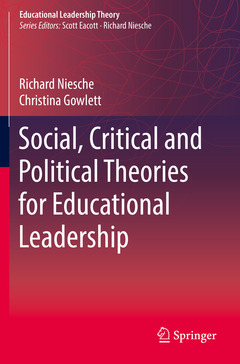Description
Social, Critical and Political Theories for Educational Leadership, 1st ed. 2019
Educational Leadership Theory Series
Authors: Niesche Richard, Gowlett Christina
Language: English
Subjects for Social, Critical and Political Theories for Educational...:
Keywords
education theory and philosophy; post-structuralism; queer theory; social theories in educational leadership; critical theories in educational leadership; political theories in educational leadership; equality in educational leadership; Michel Foucault; Judith Butler; Jacques Ranciere; Karen Barad; Bernard Stiegler
Approximative price 68.56 €
In Print (Delivery period: 15 days).
Add to cartPublication date: 08-2020
Support: Print on demand
Approximative price 94.94 €
In Print (Delivery period: 15 days).
Add to cartPublication date: 08-2019
142 p. · 15.5x23.5 cm · Hardback
Description
/li>Contents
/li>Biography
/li>Comment
/li>
This book makes the case for the continued and expanded use of social, critical and political theories in the field of educational leadership. It helps readers understand educational leadership by introducing them to a wide variety of theoretical and philosophical approaches and positions. The book incorporates a rich blend of ideas and concepts, and compares and contrasts the approaches discussed.
The content largely focuses on four educational thinkers: Michel Foucault, Judith Butler, Bernard Stiegler and Karen Barad. The chapters do not cover each thinker?s oeuvre exhaustively, but instead provide a brief overview of his/her ideas, while also helping readers understand a particular aspect of the educational leadership discourse. Each chapter also provides supplementary reading recommendations for those interested in pursuing these ideas in more depth.
Offers a straightforward introduction to a variety of theoretical perspectives
Introduces a wide range of new theoretical concepts that helps readers understand educational leadership
Provides examples of theories put into practice with regard to educational leadership issues




